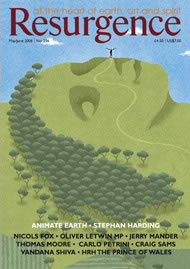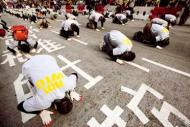IT IS AN irony of our times that the World Trade Organization (WTO) and ‘fair trade’ are now being presented as ‘development’. The enlargement of free markets for global corporations in agriculture, services and industrial products through the Doha Round of negotiations is being referred to as the ‘Doha Development Round’. ‘Develop- ment’ was also the spin for the World Trade Organization Ministerial meeting in Hong Kong last December. A special ‘development package’ titled ‘Aid for Trade’ was introduced.
Aid for Trade aims to help developing countries to build the supply-side capacity and trade-related infrastructure, such as roads, to implement WTO Agreements and expand their trade.
When the idea of ‘fair trade’ was launched through the WTO a decade ago the slogan was “Trade not Aid”. Ten years of the WTO have exposed how unfree and unfair the rules of the WTO are. ‘Development’ had become the fig leaf for the fading promise of free trade. But the Hong Kong Ministerial meeting went further than merely playing with words. What is now being offered in Aid for Trade is a new convergence between the coercive imposition of trade liberalisation by the WTO, the World Bank and the International Monetary Fund (IMF).
“Building supply-side capacity” implies the destruction of traditional small farms and people’s food sovereignty. It means the reorientation of Third World agriculture to corporate farming of cash crops for exports. “Trade-related infrastructure” implies privatisation of energy and water, privatisation of highways, ports and airports and the Walmartisation of retail. In other words, Aid for Trade implies the World Bank and IMF using their financial muscle to impose trade liberalisation and privatisation on “developing” countries. Aid for Trade implies World Bank/IMF joining with WTO to enlarge and expand markets for multinational corporations in every sector – agriculture, services, manufacturing.
This is dictatorship, not development. Development means the self-organised evolution of an organism, a person, a society, or a country. Development must therefore be based on the economic and political space for self-determination. Development in its real meaning, derived from biology, refers to self-organised evolution, not imposed change.
‘Development’ was a post-colonial project, imposing a model of progress in which the entire world remade itself, copying the colonising modern West. The assumption was that Western-style ‘progress’ was possible for all. Development, as the improved well-being of all, was thus equated with the Westernisation of economic systems based on productivity and growth.
Concepts of economic development and natural resource utilisation that had emerged in the context of industrialisation and capitalist growth during the colonial era, for the benefit of colonial powers, were applied in the entirely different context of basic needs satisfaction for the people of the newly independent Third World countries. Thus ‘development’ became a continuation of colonialism under a new name.
As Rosa Luxemburg pointed out, early industrial development in Western Europe necessitated the permanent occupation of the colonies by the colonial powers and the destruction of the local ‘natural economy’. According to her, colonialism was a necessary condition for capitalist growth: without colonies, capital accumulation would grind to a halt.
‘Development’ as capital accumulation and commercialisation of the economy thus involved the reproduction of a particular form of wealth creation, as well as the creation of poverty and dispossession. A replication of economic development based on commercialisation of resources for commodity production in the newly independent countries created the internal colonies. Development was thus reduced to a continuation of the process of colonisation; it became an extension of wealth creation in Western economic vision, which was based on the exploitation of women, degradation of nature, and erosion of traditional cultures. ‘Development’ entailed destruction for women, nature and subjugated cultures, which is why, throughout the Third World, women, peasants and tribal people are struggling for liberation from ‘development’ just as they earlier struggled for liberation from colonialism.
World Bank- and IMF-initiated structural adjustment programmes force trade liberalisation through strictly imposed conditions. They add to the devastation of their earlier financing of ‘development’. Trade liberalisation of agriculture has been imposed by changing national laws related to land and seeds, facilitating corporate control over seed supply and land ownership. Combined with the WTO’s trade liberalisation and promotion of dumping, World Bank funding has led to the impoverishment and indebtedness of the majority of farmers. For example, over the last decade more than 40,000 Indian farmers have been driven to suicide in despair as the burden of high production costs and low prices for their produce squeezes out their livelihoods and lives. If development means the death of farmers, who wants such development?
QUOTES
Development, in its real meaning, refers to self-organised evolution, not imposed change.
Development was thus reduced to a continuation of the process of colonisation; it became an extension of wealth creation in Western economic vision, which was based on the exploitation of women, degradation of nature, and erosion of other cultures.
Throughout the Third World, women, peasants and tribal people are struggling for liberation from ‘development’ just as they earlier struggled for liberation from colonialism.








